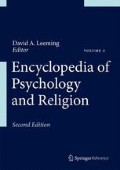Bibliography
Ayllon, T., & Azrin, N. (1968). The token economy. A motivational system for therapy and rehabilitation. New York: Appleton-Century Crofts.
Babylonian Talmud. Vilna Edition (1975). Jerusalem.
Bakan, D. (1958). Sigmund Freud and the Jewish mystical tradition. Princeton: D. Van Nostrand.
Bandura, A. (1969). Principles of behavior modification. New York: Holt, Rinehart and Winston.
Festinger, L. (1957). A theory of cognitive dissonance. Stanford: Stanford University Press.
Freud, S. (1914). On narcissism: An introduction (pp. 73–102). In J. Strachey (Ed. & Trans.), Standard edition (Vol. 14). London: Hogarth Press.
Freud, S. (1923). The ego and the id (trans: Riviere, J.). In J. Strachey (Ed.), Standard edition (Vol. 19, pp. 12–59). London: Hogarth Press.
Freud, S. (1924). The dissolution of the Oedipus complex (pp. 173–179). In J. Strachey (Ed. & Trans.), Standard edition (Vol. 19). London: Hogarth Press.
Hesiod and Theognis. (1973). Theogony and works and days (Hesiod) and Elegies (Theognis) (trans: Wender, D.). Middlesex: Penguin Classics.
Kaplan, K. J. (1998). TILT: Teaching individuals to live together. Philadelphia: BrunnerIMazel.
Kaplan, K. J., & Schwartz, M. B. (1993). A psychology of hope. An antidote to the suicidal pathology of western civilization. Westport: Praeger.
Kaplan, K. J., & Schwartz, M. B. (2006). The seven habits of the good life: How the biblical virtues free us from the seven deadly sins. Lanham: Rowman and Littlefield.
Kaplan, K. J., & Schwartz, M. B. (2008). A psychology of hope. A biblical response to tragedy and suicide. Grand Rapids: William. B. Eerdmans Press.
Marx, M. H., & Hillix, W. A. (1963). Systems and theories in psychology. New York: McGraw-Hill.
Nietzsche, F. (1956). The birth of tragedy and the genealogy of morals. Garden City: Anchor.
Plato. (1983). The republic (trans: Lee, D.). Middlesex: Penguin Classics.
Plato. (1993). The phaedo (trans: Tredennick, H., & Tarrant, H.). Middlesex: Penguin Classics.
Rottenberg, M. (1991). Dia-logo therapy: Psychonarration and PaRDeS. New York: Praeger.
Schwartz, M. B., & Kaplan, K. J. (2004). Biblical stories for psychotherapy and counseling: A sourcebook. Binghamton: The Haworth Pastoral Press.
Schwartz, M. B., & Kaplan, K. J. (2007). The fruit of her hands: A psychology of biblical woman. Grand Rapids: William B. Eerdmans Press.
Seneca, L. A., & Younger, T. (1979). Seneca. Cambridge, MA: Harvard University Press.
Shafranske, E., & Malony, H. N. (1990). Clinical psychologists’ religious and spiritual orientations and their practice of psychotherapy. Psychotherapy: Theory, Research, Practice, Training, 27, 72–78.
Shestov, L. (1966). Athens and Jerusalem. New York: Simon and Schuster.
The Holy Scriptures. (1955). Philadelphia: The Jewish Publication Society of America.
Titchener, E. B. (1899). An outline of psychology. New York: Macmillan.
Urbach, E. E. (1979). The sages: Their concepts and beliefs (trans: Abrahams, I.) (2nd ed.). Jerusalem: The Magnes Press of the Hebrew University of Jerusalem.
Wellisch, E. (1954). Isaac and Oedipus: Studies in biblical psychology of the sacrifice of Isaac. London: Routledge and Kegan Paul.
Wundt, W. (1894). Lectures on human and animal psychology (trans: Creighton, J. E., & Titchener, E. B.). New York: Macmillan.
Yerushalmi, Y. H. (1991). Freud’s Moses: Judaism terminable and interminable. New Haven: Yale University Press.
Author information
Authors and Affiliations
Corresponding author
Editor information
Editors and Affiliations
Rights and permissions
Copyright information
© 2014 Springer Science+Business Media New York
About this entry
Cite this entry
Kaplan, K.J., Schwartz, M.B. (2014). Judaism and Psychology. In: Leeming, D.A. (eds) Encyclopedia of Psychology and Religion. Springer, Boston, MA. https://doi.org/10.1007/978-1-4614-6086-2_855
Download citation
DOI: https://doi.org/10.1007/978-1-4614-6086-2_855
Publisher Name: Springer, Boston, MA
Print ISBN: 978-1-4614-6085-5
Online ISBN: 978-1-4614-6086-2
eBook Packages: Behavioral Science

